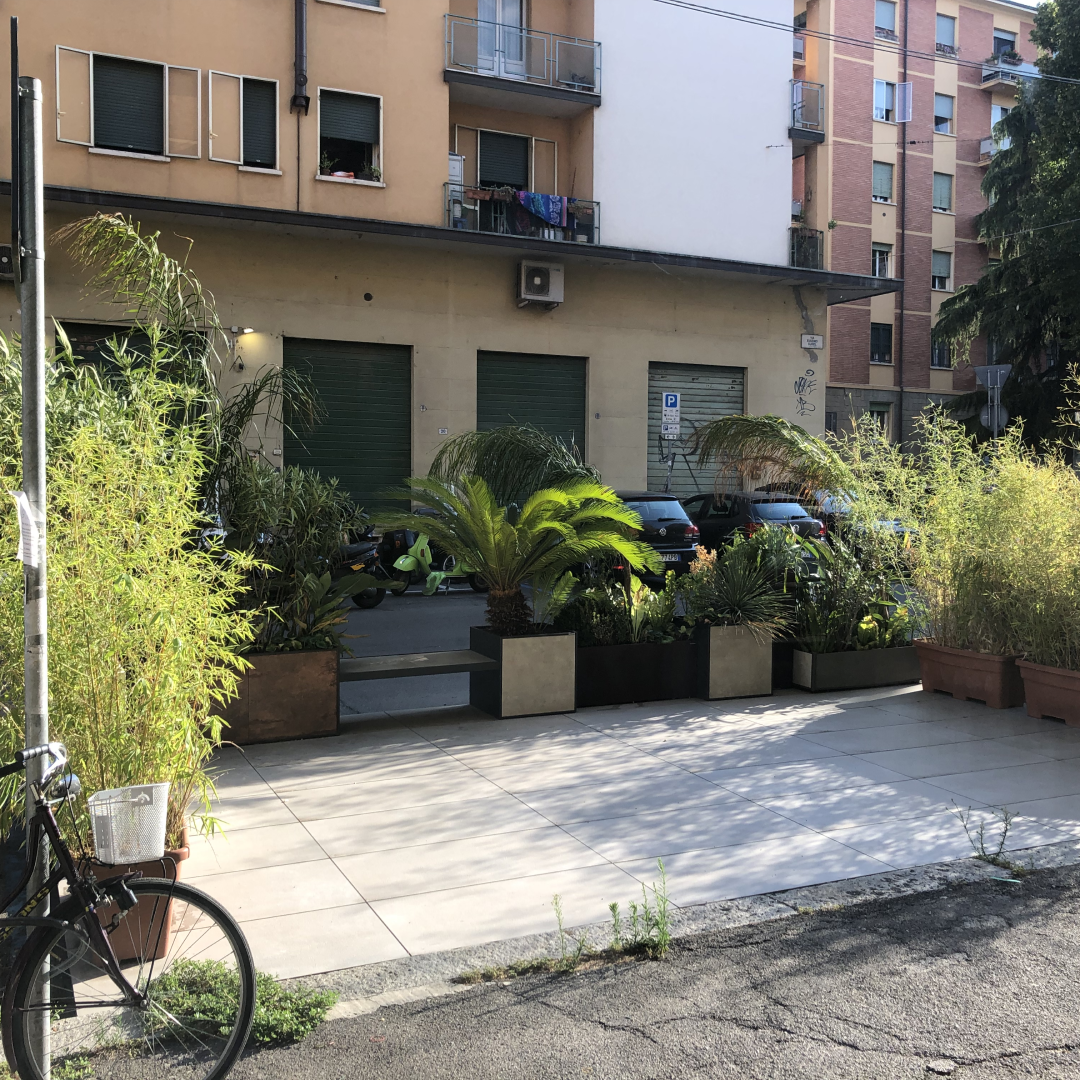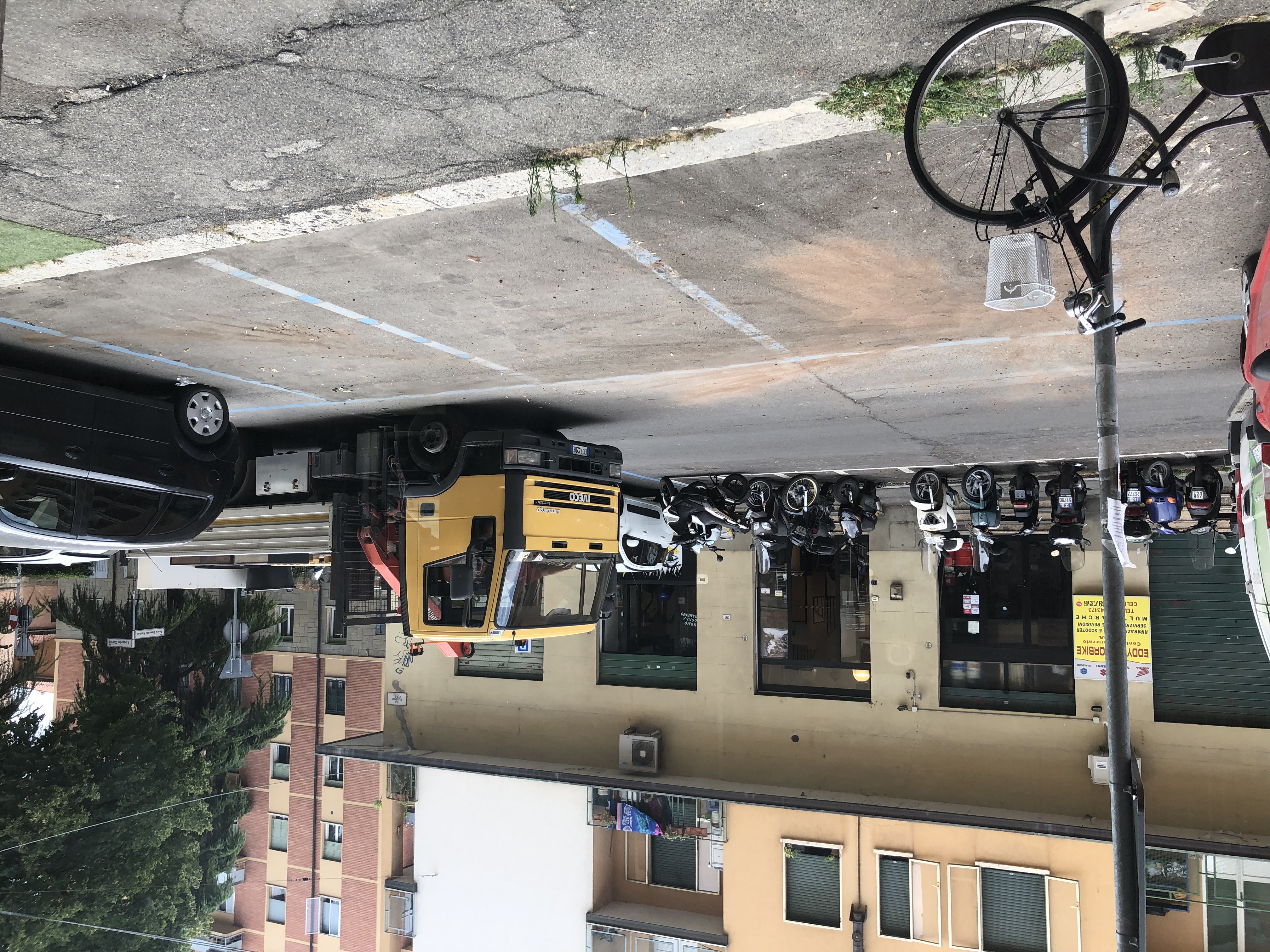What we have learned from our Parklet in Bologna
Placemaking Event
When
From 31 July 2021 to 31 December 2021
Where
Bologna (Italy)
Posted
17 January 2022
Category
Storytelling
In 2020 City Space Architecture implemented a parklet in front of its operational headquarters in the Porto-Saragozza neighbourhood, in order to promote community engagement and create cross-disciplinary learning spaces, engaging an intergenerational audience and different social groups, with special attention to the elderly and young people. Our parklet was the first-ever parklet built in the city of Bologna. It officially opened on October 4, 2020 and stayed in place for ten months, after being extended twice through an authorization for the occupation of the land granted by the Muncipality of Bologna. It was dismantled on July 30, 2021.
A parklet is a public space, for non-profit purposes and open to all, a new community landmark. It is an instrument of urban regeneration, a space for life, social interaction and sharing. Therefore, it can be used for free for events and initiatives for the neighbourhood.
The challenge of activation and management during the pandemic
From November 2020 the pandemic hit hard and the Italian government put in place severe restrictions: museums, theatres and cinemas closed, together with sport facilities, while outdoor public life was significantly monitored and controlled, so we couldn’t organize any activity at our parklet dealing with public engagement. But we witnessed a daily use of the parklet, especially from older residents and children, during their daily routines: they used the parklet to sit, to talk, to play, to eat, to read, to rest, even if for just few minutes. So the parklet became a place for the community, some residents also started to water plants, flowers and bushes in the evenings, they took care of it.
During the winter we managed to keep the parklet clean and accessible (especially after the snow), and we renovated the green several times, we pruned plants and poured water at least once a week.
At the end of April 2021, museums, theatres and cinemas reopened and the Italian government removed major restrictions for public life, including outdoor activities. So we re-started the process of engagement of local residents and citizens from Bologna, also through our dedicated Facebook group (in Italian), designed to inform local residents about the meaning and value of the parklet, also providing reference to parklets around the world and showing how the parklet could be used by the community. This Facebook group started to be followed by international scholars and practitioners that shared contents on placemaking, tactical urbanism, environmental issues, public space concepts, with projects, policies and initiatives developed in Europe and beyond, thus providing useful reading materials, and sending comments of appreciation for our work in Bologna.
The interest of artists and of local residents
In addition, during the summer 2021, several artists visited our parklet:
- the well known Italian actor and director Stefano Pesce, during the shootings of the web-series Segnali near the Arco del Meloncello, produced by Magnolia Communication Studios, on 8 May 2021. The film crew spent the whole day at City Space Architecture headquarters and enjoyed to sit outside at the parklet;
- the Italian artist and photographer Marco Bucchieri, on the occasion of the opening of his solo exhibition ‘Da dove stai chiamando?’ at City Space Architecture headquarters, on 8 July 2021, invited his friends and colleagues - artists, curators and art university professors - to sit at the parklet
- the Finnish artist Nina Backman visited our parklet and gave a lecture on her installation Miniforest in Helsinki, a unique work of art that helps preserve biodiversity, on 21 July 2021. The collaboration with City Space Architecture and the presence of Nina at our parklet combines the importance of building and protecting green areas in public spaces in Europe.
On the occasion of the temporary exhibition U R R U N at the parklet, promoted by the Mezcla collective,a group of young performers from the Porto-Saragozza neighbourhood, on 29-30 May 2021, local residents showed up with interest and curiosity and asked to know more about our work. They learned with disappointment that the parklet was a temporary intervention and that was supposed to be dismantled by the end of May 2021. Many encouraged us to keep the parklet in place as long as possible, given the upcoming summer season and the physical and psycological need to stay outside after many months of COVID-19 restrictions. As a response to this request, at the end of May we applied for the second extension of the permanence of the parklet to the Municipality of Bologna, until the end of July. After several days of negotiations and discussions with public offers, the Municipality granted permission for the occupation of the land, but only after payment of a fee, as for the previous authorizations.
The impact of the parklet
On 31 May 2021 City Space Architecture launched a social media campaign to spread awareness regarding the importance of public space, especially in the suburban contexts, and the need to invest in small, even temporary, improvements in the design of the public realm through creative placemaking. We asked to fill out a document including a comment regarding our parklet, and we asked to support our work with a donation.
We received enthusiastic replies, from Bologna and also from London, Portsmouth, Baghdad, Bogotà, Bucharest, Beirut, Quito, Melbourne, Campeche, Auckland, Tokyo, Sydney, Montreal and Famagusta.
Here are some comments of our followers and supporters:
A fantastic udea to bring the local community together offering a green space with cultural initiatives and enhancing inclusiveness – Barbora, Portsmouth
I wish I can have the same chance, to make a community space instead of parking – Wahda, Baghdad
Beautiful project – Oscar, Bogotà
Excellent initiative – Firas, Beirut
Public spaces are the places where urbanity occurs and where the urban identity is built. This kind of intervention improves the borough while strengthening the social tissue of the area. The social function of public spaces goes beyond our comprehension even today – Antonio, Campeche
We need more of this everywhere – Ana, Quito
Such initiative should be extended citywide as it not only emphasizes the priority of human over material capital, rather it also institutes places for the collective reappropriation of alienated urban space – Manfredo, Auckland
Parklets and public space have the potential to forge stronger social connections. Stronger social connections increase resilience among communities, especially of benefit in times of need and crisis. They also provide places for respite and reflection, potentially improving our mental health. Both of these points hold great significance to local administrations as these stronger social ties and benefits to mental health and wellbeing can ultimately mean less reliance on council services. It would be ideal if this small scale action research project could be financially supported by the local administration so evaluations could take place to explore the points made further above. With kind regards – Claire, Montreal
More parklets everywhere! – Sebnem, Famagusta
The farewell party
The farewell party took place on 28 May 2021 and was animated with live music and a storytelling activity on the meaning and importance of public space, encouraging participants to speak up their voices. It was attended by local residents, young artists, activists and public space lovers, of different ages, including children.
The party included a sound performance by the artistic duo Tyche and Automatòn.
On 30 July 2021 the parklet was dismantled.
Reflections
The design and management of the parklet was a really challenging activity: ten months of work, care and dedication, throughout the winter, the pandemic and the severe restrictions imposed by the Italian Government that significantly limited outdoor public life. The lacking of support from the Municipality of Bologna made it even more difficult, since local residents could not understand if the parklet was intended for public use. Actually the parklet, in the way the Muncipality granted the authorization, was a private initiative for public use, so somehow we could not fully achieve our goal, since a public-public (initiative and use) initiative has a stronger impact, also in people’s mind-set and urban culture, rather than a private-public one.
In addition in the Spring 2021 we suffered several thefts at the parklet: during the night unknown visitors stole three pots and a bench (all rented from our supplier), leaving plants and bushes abandoned in the parklet. These illegal actions, that City Space Architecture (CSA) promptely reported to the police, had several effects: one one hand they created disappointment from local residents, since they could no longer sit on one of the benches; on the other hand it showed residents how much we cared about the parklet since after every theft CSA was cleaning and setting up plants and trees, adding several chairs to replace the bench, so that the parklet could always be welcoming and comfortable. In addition, the supplier of the green furniture helped us to replace the threes and plant and didn’t ask to pay for the additional furniture we requested. With the supplier of the stolen pots we negotiated a small payment, since we could not return hired materials. So both private suppliers supported CSA and the parklet, since they understood that the project was really relevant for us and for the neighbourhood.
The parklet achieved the A-Place objectives, that were set during the planning phase:
- It developed a creative placemaking practice and exploited the potential of networked artistic practices, from a design perspective and also through the engagement of Italian and international artists and art curators, allowing transational mobility
- It created cross-disciplinary learning spaces, both online (on our Facebook group) and offline
- It exploited the capacity of digital technologies to support place making practices, through the Facebook group and the social media campaign
- It enhanced intercultural dialogues, by bringing together diverse social groups and expertise.
Next steps
On the day of the dismantling of the parklet, some residents asked if we were planning to do something else in the neighbouhood. So the parklet created an expectation. For the next year CSA is discussing with several potential partners another placemaking activity in the Porto-Saragozza neighbourhood, that could combine public space with nature-based solutions, giving more emphasis on the integration of nature in the urban context for community resilience, in order to foster climate activism.
Other files:
Participants
Local residents, members affiliated to City Space Architecture, public space activists, environmental activists, artists and art curators.


